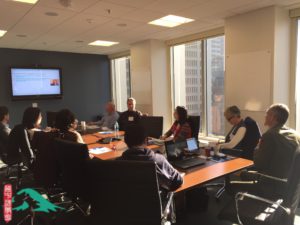
On October 4, 2018, the Washington State China Relations Council held its fifth session of the Corporate Executive Briefing Series, featuring Dane Chamorro, Senior Partner at Control Risks Asia Pacific business. A former US diplomat, Dane was previously Director of Global Risk Analysis for the Asia Pacific region and Managing Director of the company’s North Asia business, encompassing Greater China, Korea and Mongolia. The Corporate Executive Briefing Series is a series of conversations which aims to provide a unique venue in which Washington business owners and executives can substantively increase their knowledge of commercial engagement with and in China.
Control Risks is a specialist global risk consultancy that helps organizations succeed while remaining secure, compliant and resilient. Drawing from his extensive experience working throughout China and Asia for Control Risks, Dane discussed how President Xi Jinping is altering the Chinese economic and political landscape in a manner that emphasizes a Party led, regulatory driven model governing data, capital, social control. This “alternate ecosystem” will require foreign operators to adapt to new rules, and standards. Using the example of increased steel production in provinces outside of Beijing’s vicinity despite regulatory pressure, Dane explained the motives and targets of the Chinese government’s massive reorganization led by President Xi.
In terms of foreign involvement in China through businesses, investment, and other avenues, Dane cautioned that trade conditions will worsen before they improve as the US-China trade dispute unfolds. He cited a few specific ways in which US companies will be impacted, concluding that foreign manufacturers are likely to benefit in the short term and see some business growth. However, multinationals will remain disadvantaged in the longer term as they are unlikely to have equal opportunities as local competitors, given the national and local resources and support that local Chinese companies can access, and the operational and regulatory obstacles that foreign companies are facing.
The Q&A session addressed the changing role of due diligence in the China market during this moment in US-China relations, as well as the experience of US businesses working with Chinese partners. In answering an audience question about precautions companies should take before doing business in China, Dane called attention to the need for a comprehensive appraisal of a businesses and prospective partners, especially to establish assets and potential liabilities.
WSCRC extends thanks to WSCRC board member Sean Connell for serving as a moderator for the event.
Summary author: Mengyao Liu
